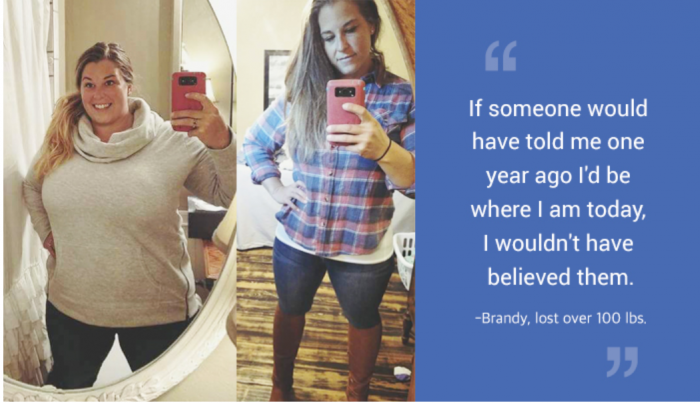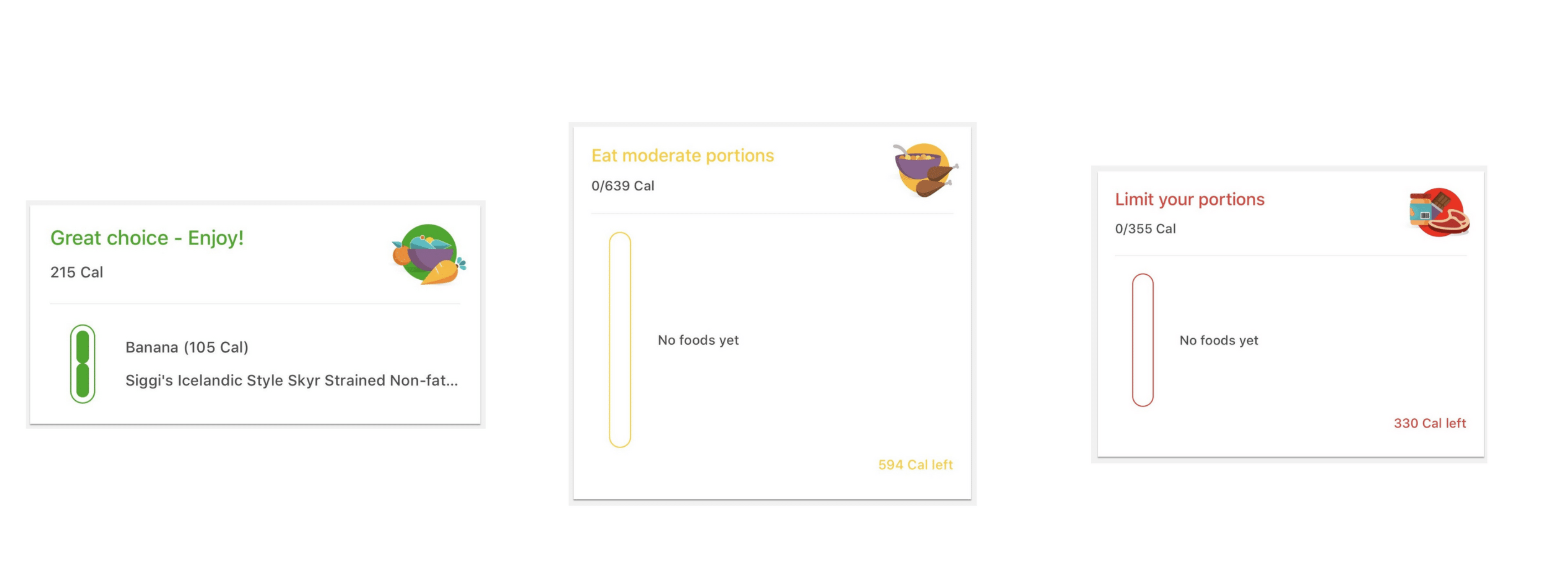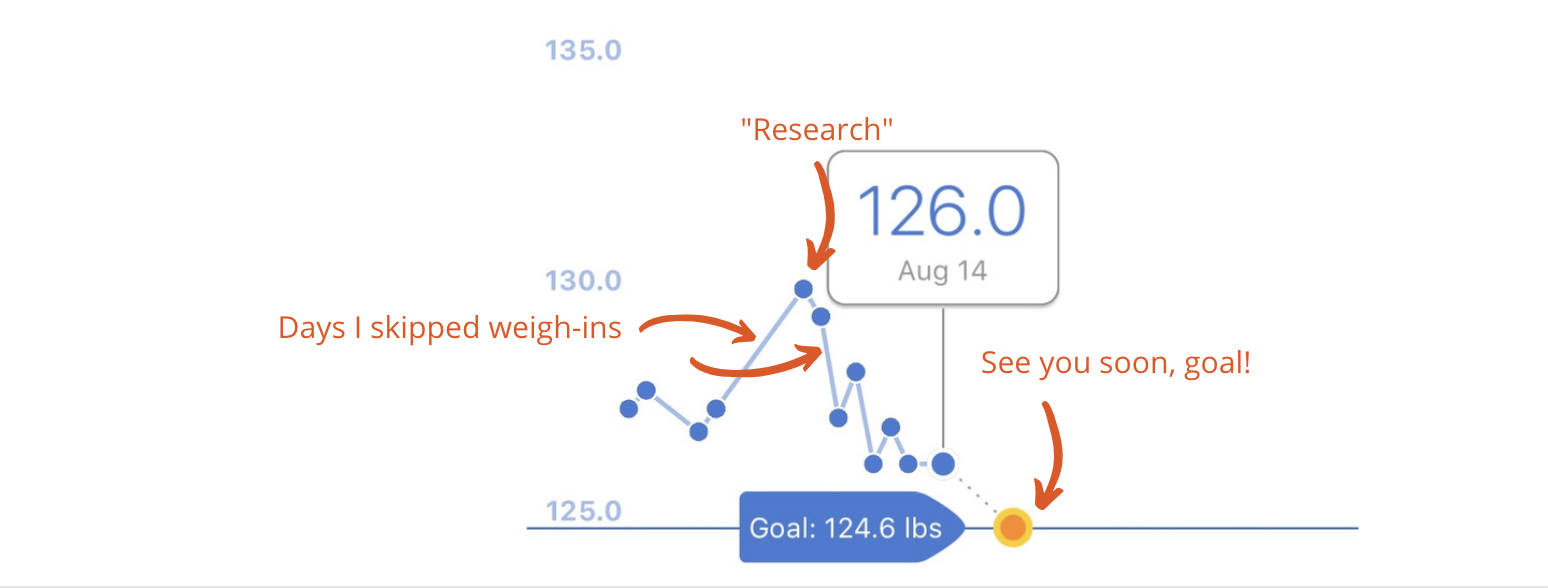This article is written with Noom—an Elephant Mindful Partner. They’re dedicated to making healthy living easier for us all, and we’re honored to work with them. ~ ed.
Noom has cursed me with enlightenment, as the Buddhists say. And there’s no going back.
I created my Noom account the day before I left for a two-month trip to the U.K. My dad ordered a pizza for dinner.
As is my pizza-proclivity, I proceeded to eat three extra-cheesy pieces, crusts and all, without batting an eye.
As is my perfectionism-proclivity, I wanted to be really good at this whole eating healthy thing from the second I started, and wasn’t too keen on my first-ever logged meal being three slices of pizza that probably contained my entire calorie budget for the day.
So, ladies and gentlemen, I bailed on day one.
Please, hold your applause.
If this leaves you thinking you are reading the review of a human who is highly unqualified to be speaking about the best way to lose weight—you’re probably right. But I have a case for that actually being a pretty good reason to stick this out to the end:
We all fall off the band wagon. We all tend to want to be good at stuff, and get frustrated when we “fail.” We all, from time to time, scarf down three pieces of pizza without an ounce of regret simply because we hold an unwavering belief that pizza is one of the simplest and purest joys life has to offer (okay, maybe that one’s just me).
Basically, everything that can throw a wrench in weight-loss journeys has happened during my time with Noom: my own lack of total commitment, a healthy dose of skepticism about dieting in general, and a smorgasbord of “good” excuses from airports to other people cooking to birthday celebrations.
And guess what? I still lost weight.
And even more importantly: I actually kind of liked the process.
A little bit about where I started.
It’s important for me to make clear that I am not, by any medical standards, overweight.
However, I have an appetite that rivals Adam Richman, and when I started Noom I was at my heaviest, working out consistently, and frustrated but unwilling to acknowledge my diet might be the problem.
I have never once counted a calorie, and it was actually an unfortunate anomaly that I even knew I was at my heaviest weight. I try to avoid scales as much as I can, because they almost always ruin my day.
After the most recent instance of having my day ruined by a small plastic box, I considered the following things:
- Should I incinerate all the scales, or try to stop letting three numbers somehow radically change the perception of my body I held 30 seconds before? (This is a genuine conundrum for me: in this particular circumstance, I truly do believe ignorance can be bliss. But I’m also a bit of a control freak, and am not thrilled over the level of control I allow a scale to have over me.)
- Is everything I thought I knew about avocados being “the good kind of fat” a lie?
- Maybe instead of trying to burn more and more calories with longer and longer runs, I should just try to, like, not eat three pieces of pizza?
Take a 30-second evaluation to find out how much weight you could lose >>
Enter Noom.
I was skeptical from the start. I don’t much like being told what to do (or eat), and was entirely convinced that dieting apps are just another way to add shame and guilt and insecurity to our perception of food and body, and that counting every calorie and doing daily weigh-ins are disastrous for our mental health.
Here’s how it all played out.
The signup process:
Upon signing up, you are asked to fill out a rather extensive questionnaire. Family history, ability levels, mental health history, work environment, dietary restrictions, and all the basics like age and weight and weight-loss goal.
Your account comes with a personal goal specialist who you can reach out to on your own, and who follows up on any goals you set, helps refine goals so they are achievable and effective, and keeps you accountable. You can choose the type of personality you want your coach to have—someone who sends positive affirmations on a hard day or someone who will let you vent without trying to shower you in sunshine, for example. I chose the latter—let me bask in my thunderstorm, please.
You also choose the speed at which you want to reach your goal: are you someone who likes things done as quickly as possible, gradually and steadily, or slowly? I chose the fastest option, and in retrospect I probably wouldn’t do that again. My calorie budget is quite low, and based on my aforementioned appetite levels, has been a dramatic adjustment that is not easy to maintain consistently.
Your Big Picture:
In Week 1, Noom has you set Your Big Picture goal. They specifically say it can be weight-oriented or not (“I want to lose 10 pounds” versus “I want to run a 5K”), but naming your goal isn’t the end of the process. You’re taken through at least three rounds of “why” before you can commit to Your Big Picture, “like peeling back the layers of an onion,” as the #NoomNerds put it. Then, they ask you if you’re satisfied with your goal and your reasoning. If not, you can keep going. If so, you’ve uncovered what is close to the real reason we want to lose weight in the first place.
This is a huge plus of the program for me: they don’t just let you get away with wanting to look “better” or “skinnier” or what have you, they at least try and make you examine your motivations and beliefs about your body, your weight, and your self-image. (Don’t say I didn’t warn you: Noom gets deep.)
The program:
There are three basic steps every day: weigh in, log your meals, and work through a new set of articles, tips, and the occasional quiz. The whole shebang probably takes 10-15 minutes total out of your day. No sweat there.
Sometimes, the learning material is focused on psychology and understanding yourself better, other times it’s based on dispelling common food myths or understanding the quality and effects of different foods and food groups. They even provide you with lists of substitutes for common high-calorie choices, and you can save any article to your “saved articles” tab to refer back to easily. I have about ten articles saved that I’ve never gone back to, but they’re there if I want them, and that helps me sleep at night.
The calorie situation & logging your meals:
Find out more about how & why Noom works >>
For the first week, I basically continued to eat as I normally would. Because I’d never tracked calories before, I wanted to know what my normal diet looked like calorically, and how good I am at instinctually identifying healthy and unhealthy food option (turns out I was pretty bad).
Logging my food was an incredibly easy process—there’s a whole library of brands and restaurant items so you can choose the exact bag of chips or cup of yogurt or, ahem, pizza you’re eating and get an accurate calorie count. It grouped that food into one of three categories: green, yellow, or red. It gave me a daily breakdown of recommended calories per color group that you should allot yourself each day based on your calorie budget.
Even more than in the daily articles, this food breakdown is where the most learning happened for me.
I discovered I eat a lot of yellow foods (spoiler alert: avocados and all of that infamous “good fat” are yellow), which isn’t the worst, but made me think about how I could swap out one or two yellow items per meal for a green item. I also learned that a lot of “little” things I’d add to meals (olive oil, cream cheese, cheese in general) were red foods, and even a small amount of each could easily double the calories of my lunch and not actually add that much in terms of taste/fullness.
Added bonus: Noom syncs up with my Apple Watch (and a few other similar devices), so it tracked my activity and added a half-calorie to my budget for every calorie burned throughout the day. Admittedly, this was a big factor in my being able to stay within my calorie budget—on the days I didn’t workout, I normally went over, but that’s probably due to choosing the fastest paced program.
What happens when you “fail?”
There may or may not have been days where I could have easily logged every meal, weighed in each morning, and read every article presented to me, and chose not to.
This was either because I was feeling rebellious and stubborn and not wanting to be caught out on a weekend binge, or because I was selflessly sacrificing a perfect week of Noom-ing to do research into the app, all so I could answer this question for you.
Either way, I was pleasantly surprised to learn that even if I went over my red-food budget for the day, woke up two pounds heavier, or skipped out on a few days of meal-logging, I didn’t get a virtual dunce hat or reprimanded by my coach. I was given space to first become aware, then to be educated, and then to adjust accordingly, if I wanted to.
And, as you might have guessed, I ended up actually wanting to.
Even without the prompts to log my meals. Even without being aware of exactly how many calories I had left for the day. Even without knowing if I hit my step-goal. Even if no one would know that I went over my calorie count or that I ate a disproportionately large amount of red-food to green-food.
I would look at the food options in front of me, and because of my newfound #NoomKnowledge, I would choose the meal with more green foods, one scoop of rice instead of two, black coffee instead of a latte.
How a scale-hating calorie-avoider made peace with a weight loss app.
At the end of the day, I made peace with the weigh-ins and calorie-counting by immersing myself in the program, learning from Noom, and then doing what worked best for me.
I don’t weigh myself every day, but I do keep track of what I’m eating. That way, my expectations are more realistic when I do get on the scale (I’m not usually shocked one way or the other anymore), and I’m continuing to learn about the food I eat and what my healthy and unhealthy tendencies are.
All of the journeys we take in this life are highly personal and subject to derailment at the slightest pebble in our path. The cool thing about Noom: it anticipates those pebbles and prepares you for how to gracefully step over them (or heroically kick them out of the way), and its holistic approach to measuring and tracking weight gives you a little breathing room to succeed even without nailing every single element.
Try Noom for 2 weeks, here >>
 Share on bsky
Share on bsky




Read 6 comments and reply